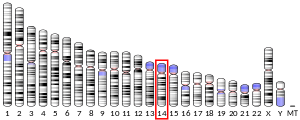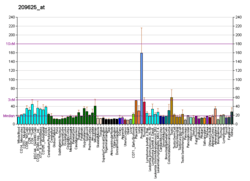PIGH
Phosphatidylinositol N-acetylglucosaminyltransferase subunit H is an enzyme that in humans is encoded by the PIGH gene.[5][6] The PIGH gene is located on the reverse strand of chromosome 14 in humans, and is neighbored by TMEM229B.[7]
This gene encodes an endoplasmic reticulum associated protein that is involved in glycosylphosphatidylinositol (GPI)-anchor biosynthesis. The GPI anchor is a glycolipid found on many blood cells and which serves to anchor proteins to the cell surface. The protein encoded by this gene is a subunit of the GPI N-acetylglucosaminyl (GlcNAc) transferase that transfers GlcNAc to phosphatidylinositol (PI) on the cytoplasmic side of the endoplasmic reticulum.[6]
Interactions
References
- 1 2 3 GRCh38: Ensembl release 89: ENSG00000100564 - Ensembl, May 2017
- 1 2 3 GRCm38: Ensembl release 89: ENSMUSG00000021120 - Ensembl, May 2017
- ↑ "Human PubMed Reference:".
- ↑ "Mouse PubMed Reference:".
- ↑ Ware RE, Howard TA, Kamitani T, Change HM, Yeh ET, Seldin MF (Jul 1994). "Chromosomal assignment of genes involved in glycosylphosphatidylinositol anchor biosynthesis: implications for the pathogenesis of paroxysmal nocturnal hemoglobinuria". Blood. 83 (12): 3753–7. PMID 8204896.
- 1 2 "Entrez Gene: PIGH phosphatidylinositol glycan anchor biosynthesis, class H".
- ↑ "AceView: Homo sapiens gene PIGH". AceView. National Library of Medicine. Retrieved 24 April 2011.
- ↑ Watanabe, R; Inoue N; Westfall B; Taron C H; Orlean P; Takeda J; Kinoshita T (Feb 1998). "The first step of glycosylphosphatidylinositol biosynthesis is mediated by a complex of PIG-A, PIG-H, PIG-C and GPI1". EMBO J. ENGLAND. 17 (4): 877–85. doi:10.1093/emboj/17.4.877. ISSN 0261-4189. PMC 1170437. PMID 9463366.
Further reading
- Rual JF, Venkatesan K, Hao T, et al. (2005). "Towards a proteome-scale map of the human protein-protein interaction network". Nature. 437 (7062): 1173–8. Bibcode:2005Natur.437.1173R. doi:10.1038/nature04209. PMID 16189514.
- Gerhard DS, Wagner L, Feingold EA, et al. (2004). "The Status, Quality, and Expansion of the NIH Full-Length cDNA Project: The Mammalian Gene Collection (MGC)". Genome Res. 14 (10B): 2121–7. doi:10.1101/gr.2596504. PMC 528928. PMID 15489334.
- Suzuki Y, Yamashita R, Shirota M, et al. (2004). "Sequence Comparison of Human and Mouse Genes Reveals a Homologous Block Structure in the Promoter Regions". Genome Res. 14 (9): 1711–8. doi:10.1101/gr.2435604. PMC 515316. PMID 15342556.
- Strausberg RL, Feingold EA, Grouse LH, et al. (2003). "Generation and initial analysis of more than 15,000 full-length human and mouse cDNA sequences". Proc. Natl. Acad. Sci. U.S.A. 99 (26): 16899–903. Bibcode:2002PNAS...9916899M. doi:10.1073/pnas.242603899. PMC 139241. PMID 12477932.
- Watanabe R, Inoue N, Westfall B, et al. (1998). "The first step of glycosylphosphatidylinositol biosynthesis is mediated by a complex of PIG-A, PIG-H, PIG-C and GPI1". EMBO J. 17 (4): 877–85. doi:10.1093/emboj/17.4.877. PMC 1170437. PMID 9463366.
- Watanabe R, Kinoshita T, Masaki R, et al. (1996). "PIG-A and PIG-H, which participate in glycosylphosphatidylinositol anchor biosynthesis, form a protein complex in the endoplasmic reticulum". J. Biol. Chem. 271 (43): 26868–75. doi:10.1074/jbc.271.43.26868. PMID 8900170.
- Kamitani T, Chang HM, Rollins C, et al. (1993). "Correction of the class H defect in glycosylphosphatidylinositol anchor biosynthesis in Ltk- cells by a human cDNA clone". J. Biol. Chem. 268 (28): 20733–6. PMID 8407896.
This article is issued from
Wikipedia.
The text is licensed under Creative Commons - Attribution - Sharealike.
Additional terms may apply for the media files.




